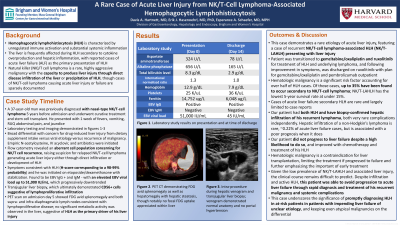Sunday Poster Session
Category: Liver
P1426 - A Rare Case of Acute Liver Injury From NK/T-Cell Lymphoma-Associated Hemophagocytic Lymphohistiocytosis
Sunday, October 27, 2024
3:30 PM - 7:00 PM ET
Location: Exhibit Hall E

Has Audio

Davis A. Hartnett, MD
Brigham and Women's Hospital
Cambridge, MA
Presenting Author(s)
Davis A. Hartnett, MD1, Erik Hasenoehrl, MD, PhD2, Esperance Schaefer, MD, MPH2
1Brigham and Women's Hospital, Cambridge, MA; 2Brigham and Women's Hospital, Boston, MA
Introduction: NK/T-cell lymphoma is a rare hematologic malignancy associated with Epstein-Barr virus (EBV) infection. Hemophagocytic lymphohistiocytosis (HLH) is a life-threatening syndrome of systemic inflammation that can occur secondary to both NK/T-cell lymphoma and EBV infection. Some degree of hepatic dysfunction is common but cases of acute liver injury due to NK/T-cell lymphoma are infrequent, though progression to acute liver failure is an often fatal sequela in these patients. We present the case of a young patient presenting with acute liver injury found to have recurrent NK/T-cell lymphoma with both hepatic infiltration and HLH.
Case Description/Methods: A 37-year-old man was previously NK/T-cell lymphoma 5 years before admission who underwent curative chemotherapy and radiotherapy followed by stem cell transplant presented following 1 week of fevers, nausea, vomiting, and abdominal pain. Physical exam was notable for right upper quadrant pain and mild jaundice, with persistent fevers and tachycardia. Laboratory testing demonstrated LFT derangements (AST 324, ALT 656), INR 1.3, platelets 25, and elevated inflammatory markers. Abdominal ultrasound and magnetic resonance imaging demonstrated nonspecific periportal and gallbladder edema, diffuse fatty infiltration of the liver, and splenomegaly. Empiric N-acetylcysteine and IV acyclovir for herpes simplex were initiated, as well empiric antibiotics. Viral studies including HIV, CMV, and HSV returned normal. Flow cytometry revealed an aberrant cell population concerning for relapsed NK/T-cell lymphoma. Clinical picture was concerning for HLH (H-score corresponding to a 98-99% probability), he was initiated on etoposide/dexamethasone with stabilization of fevers and labs. He was found to be EBV IgG positive and IgM negative with an elevated EBV viral load up to 51,000 IU/mL, which progressively downtrended on biweekly checks. Urgent liver biopsy demonstrated CD56+ cells suggestive of lymphoproliferative infiltration. He was transitioned to gemcitabine/oxaliplatin and ruxolitinib for treatment of HLH as well as the underlying lymphoma, and following improvement in symptoms, was discharged on ruxolitinib with planned outpatient gemcitabine/oxaliplatin and pembrolizumab.
Discussion: This case highlights a rare overlap of complications of NK/T-cell lymphoma; rapid diagnosis and initiation of treatment prevented this patient from progressing to acute liver failure, as occurred in all similar cases documented in the literature.
Disclosures:
Davis A. Hartnett, MD1, Erik Hasenoehrl, MD, PhD2, Esperance Schaefer, MD, MPH2. P1426 - A Rare Case of Acute Liver Injury From NK/T-Cell Lymphoma-Associated Hemophagocytic Lymphohistiocytosis, ACG 2024 Annual Scientific Meeting Abstracts. Philadelphia, PA: American College of Gastroenterology.
1Brigham and Women's Hospital, Cambridge, MA; 2Brigham and Women's Hospital, Boston, MA
Introduction: NK/T-cell lymphoma is a rare hematologic malignancy associated with Epstein-Barr virus (EBV) infection. Hemophagocytic lymphohistiocytosis (HLH) is a life-threatening syndrome of systemic inflammation that can occur secondary to both NK/T-cell lymphoma and EBV infection. Some degree of hepatic dysfunction is common but cases of acute liver injury due to NK/T-cell lymphoma are infrequent, though progression to acute liver failure is an often fatal sequela in these patients. We present the case of a young patient presenting with acute liver injury found to have recurrent NK/T-cell lymphoma with both hepatic infiltration and HLH.
Case Description/Methods: A 37-year-old man was previously NK/T-cell lymphoma 5 years before admission who underwent curative chemotherapy and radiotherapy followed by stem cell transplant presented following 1 week of fevers, nausea, vomiting, and abdominal pain. Physical exam was notable for right upper quadrant pain and mild jaundice, with persistent fevers and tachycardia. Laboratory testing demonstrated LFT derangements (AST 324, ALT 656), INR 1.3, platelets 25, and elevated inflammatory markers. Abdominal ultrasound and magnetic resonance imaging demonstrated nonspecific periportal and gallbladder edema, diffuse fatty infiltration of the liver, and splenomegaly. Empiric N-acetylcysteine and IV acyclovir for herpes simplex were initiated, as well empiric antibiotics. Viral studies including HIV, CMV, and HSV returned normal. Flow cytometry revealed an aberrant cell population concerning for relapsed NK/T-cell lymphoma. Clinical picture was concerning for HLH (H-score corresponding to a 98-99% probability), he was initiated on etoposide/dexamethasone with stabilization of fevers and labs. He was found to be EBV IgG positive and IgM negative with an elevated EBV viral load up to 51,000 IU/mL, which progressively downtrended on biweekly checks. Urgent liver biopsy demonstrated CD56+ cells suggestive of lymphoproliferative infiltration. He was transitioned to gemcitabine/oxaliplatin and ruxolitinib for treatment of HLH as well as the underlying lymphoma, and following improvement in symptoms, was discharged on ruxolitinib with planned outpatient gemcitabine/oxaliplatin and pembrolizumab.
Discussion: This case highlights a rare overlap of complications of NK/T-cell lymphoma; rapid diagnosis and initiation of treatment prevented this patient from progressing to acute liver failure, as occurred in all similar cases documented in the literature.
Disclosures:
Davis Hartnett indicated no relevant financial relationships.
Erik Hasenoehrl indicated no relevant financial relationships.
Esperance Schaefer indicated no relevant financial relationships.
Davis A. Hartnett, MD1, Erik Hasenoehrl, MD, PhD2, Esperance Schaefer, MD, MPH2. P1426 - A Rare Case of Acute Liver Injury From NK/T-Cell Lymphoma-Associated Hemophagocytic Lymphohistiocytosis, ACG 2024 Annual Scientific Meeting Abstracts. Philadelphia, PA: American College of Gastroenterology.
